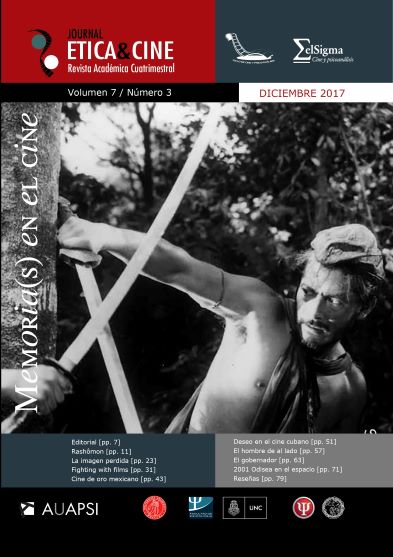The Memory and its connection to the past
DOI:
https://doi.org/10.31056/2250.5415.v7.n3.19619Keywords:
Reconstructive memory, Past, Truth, Truthfullness, Self-deception, SelfishnessAbstract
Taking as starting point Akira Kurosawa’s film, I analyse the tension between the reconstructive nature of memory and the possibility of knowing truths from the past, and I explore if the tendency to align our personal memories to our present interests necessarily leads to an sceptic and relativistic vision of the knowledge from the past.References
Aristóteles (350 a. C.). On Memory and Reminiscence [versión electrónica]. Recuperado en http://classics.mit.edu/Aristotle/m.
Agustin de Hipona (400). Confessions [versión electrónica]. Recuperado en http://www.documentacatholicaomnia.
Bartlett, F.C. (1932). Remembering. Cambridge, Cambridge University Press.
Bernstein D. & Loftus E. (2009). How to tell if a particular memory is true or false. Perspectives on Psychological Science, 4(4), 370 374.
Conway M. A., & Loveday C. (2015). Remembering, Imagining, False Memories and Meaning. Consciousness and Cognition, 33, 574-581. doi:10.1016/j.concog.2014.12.002
Flavell, J. H. (1971). Whay is memory development the development of? Human Development, 14(4), 272-278.
Goleman, D. (1985). Vital lies, simple truths. The psychology of self-deception. London, Bloomsbury.
Hume, D. (1732). A Treatise of Human Nature [versión electrónica]. Recuperado en http://www.earlymoderntexts.com/ass.
Kurosawa, A. (1982). Something like an Autobiography. New York, Vintage Books Edition.
Locke, J. (1690). An Essay Concerning Human Understanding [versión electrónica]. Recuperado en http://www.earlymoderntexts.com/ass.
Neisser, U. (1967). Cognitive Psychology. New York, Appleton Century-Crofts.
Nietzsche, F. (1873). Sobre verdad y mentira en sentido extramoral. Madrid, Tecnos.
Russell, B. (1921). The Analysis of mind [versión electrónica]. Recuperado en https://archive.org/details/analysi.
Williams B. (2002). Truth and Truthfulness: An Essay in Genealogy. Princeton, Princeton University Press.
Downloads
Published
Issue
Section
License
Los autores que publiquen en Ética y Cine Journal aceptan las siguientes condiciones:
Los autores/as conservan los derechos de autor © y permiten la publicación a Ética y Cine Journal, bajo licencia CC BY-SA / Reconocimiento - Reconocimiento-CompartirIgual 4.0 Internacional. La adopción de esta licencia permite copiar, redistribuir, comunicar públicamente la obra, reconociendo los créditos de la misma, y construir sobre el material publicado, debiendo otorgar el crédito apropiado a través de un enlace a la licencia e indicando si se realizaron cambios.

Este obra está bajo una licencia de Creative Commons Reconocimiento-CompartirIgual 4.0 Internacional.




